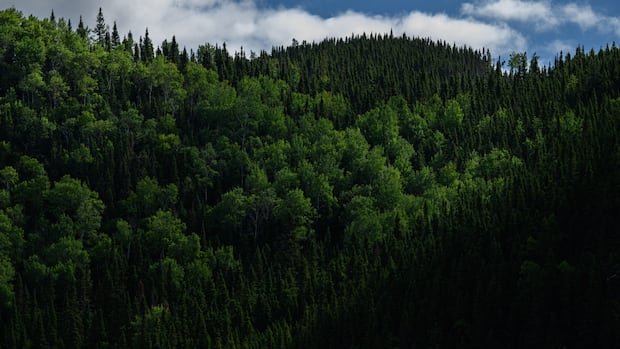Quebec’s radical reform on how forests are handled is causing concerns among indigenous leaders, conservation groups and unions, which warn the changes prioritize logging over the long -term health of the ecosystem.
The bill 97, presented this spring by the Minister of Natural Resources and Forests Maïté Blanchette Vézina, proposes to divide the forest into three zones: one that prioritizes conservation, one focused on the production of wood and a third area for multiple uses.
At least 30 percent of Quebec forests will fall into that second category, said Blanchette Vézina.
Speaking at the Legislative Hearing on Bill 97, which concluded this week, the head of the Anishnabe Nation of Lac-Simon, Lucien Wabanonik, says he wants to see him discarded and re-written from scratch in collaboration with the people of the first nations.
“They call it Triade In French, which means that 30 percent of the territory will be used specifically by the industry excluding other users. They exclude everyone else, “he said.
“The way in which it was presented is very negative. It is very negative to our rights as the first nations.”
The consultations are ongoing in bill 97 in the National Assembly, and there is a lot of anger. The legislation aims to modernize the way in which forests are managed in Quebec. But the assembly of the first nations believes that the bond of trust with the Minister of Natural Resources is broken, and the blockages of forest roads are probably the tip of the iceberg.
The Assembly of the first Quebec-Labrador (AFNQL) nations argues that the bill essentially gives the forest industry the right to avoid consultations with the first nations regarding activities in those zonal territories for intensive logging.
“Once again, we face a fait accompli“The chief of the AFNQL, Francis Verreault-Paul, told the minister this week.” Today we face a result with the presentation of this bill and we are asking that its foundation experiences important changes. ”
Concerns about the acceleration of forest degradation
In the bill, any activity that interferes or restricted Forestry development efforts are prohibited with the exception of indigenous activities carried out for national, ritual or social purposes.
But that clause “in no way guarantees the preservation of the quality of these territories, which are essential for the preservation of their forms of traditional life, cultures and languages,” wrote the AFNQL in its notice submitted to the parliamentary commission that studies the bill.
The group is also concerned about the potential acceleration of forest degradation, a concern shared by the unions that represent workers in the forestry sector.

The bill 97 places the forestry industry as the main actor responsible for forest management in intensive forest areas, Argues the CSN and FIM-CSN unions.
“Wooden companies tend to exploit the forest as quickly as possible to increase short -term profits. For workers, the important thing is to maintain good long -term jobs,” the unions wrote in a statement.
Conservation groups such as Nature Québec, on the other hand, are concerned about what ecological precautions will be applied in priority forest development zones to maintain Quebec forests resistant to climate change and how conservation areas will be delimited.
“In addition, rejuvenating forests at the same time that forest fires are about to intensify is a high -risk strategy,” the organization wrote in its warning.
Despite criticism, Blanchette Vézina insists that her motivation is to help first and all the communities that live from forestry, not the industry itself.
“We have to act because we have [U.S. President] Trump that is a threat, there is soft wood dispute, there is the business environment that has been cited as too restrictive … and there are factor closures, “he said speaking with journalists on Tuesday.
“It is for the economy of the regions of forest communities … they are the workers I am thinking.”
“Democratic Backslunding,” says the environmental group
The biodiversity and forest management professor, Christian Messier, presented the Triad to Blanchette Vézina model a few years ago.
But, he says, the bill does not reflect its application of the model, with which he has been experiencing in the central forests of Quebec during the last 15 years.
“The objective is to reduce the amount of conflict between different users [of the forest]. And maybe that is the first problem I see, “he said.
“I think the Government developed this idea of the triad without a very solid consultation in which everyone sits around the table and decides what will be the best zoning you do between protected areas, areas of multipurpose and intensive forest uses.”
Blanchette Vézina said he directed “extensive” consultations for 2024, which included indigenous groups. But Verreault-Paul said that a Board with indigenous leaders was only formed after the bill was presented in April 2025, despite its explicit request to be consulted beforehand.

According to the bill, the different forest areas will be delimited in collaboration with relevant ministers, indigenous communities and regional municipalities of the County.
However, critics notice the bill 97 Abole regional consultation tables, scale the public consultation requirements and transfers more powers to regional managers designated by the Ministry, which directly inform the Forester Chief Office.
The regional Quebec councils on the environment (RNCREQ) qualified it as “democratic recoil”, while the alliance for Forêt Boréale (AFB), which represents forest communities, maintained that it would damage public confidence in forest projects.
“If we are not at the decision -making table, it will be difficult for us to move forward,” said AFB president Yanick Baillargeon.
He added that he wants regional managers to be more independent from the Ministry and locally chosen.
Testifying Wednesday, the Conseil de l’en Forestière du Qubec Industry Group Welcome to the Blanchette Vézina bill, saying that it offers more predictability and makes the industry more competitive.
The president of the Council, Jean-François Samray, said that the bill is a “good step forward” and feels a base that decentralizes forest management. But still, it is still too prescriptive, he said.
“All it does is sell paper because it is excessively thick, so we will thank you for that, but that document stifles the industry,” he said.









